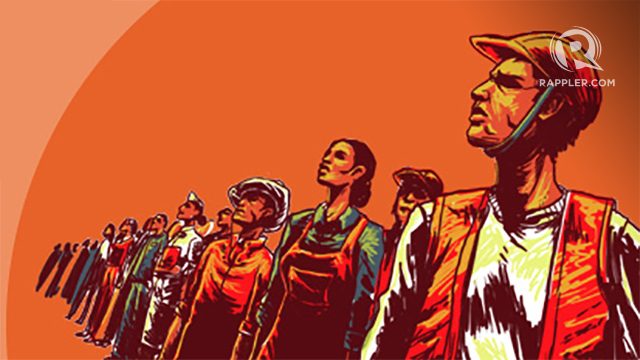SUMMARY
This is AI generated summarization, which may have errors. For context, always refer to the full article.
 After my over 20 years of working as staff reporter for the Manila Bureau of several Japanese media organizations, I never thought that I would eventually count as one of the 2.3 million overseas Filipino workers. I grew up being acquainted with the OFW tag as those mostly working in Saudi Arabia, Hong Kong, Japan, and the seafarers onboard oil tankers, cargo vessels, and cruise liners.
After my over 20 years of working as staff reporter for the Manila Bureau of several Japanese media organizations, I never thought that I would eventually count as one of the 2.3 million overseas Filipino workers. I grew up being acquainted with the OFW tag as those mostly working in Saudi Arabia, Hong Kong, Japan, and the seafarers onboard oil tankers, cargo vessels, and cruise liners.
This was as if Filipinos working in western countries such as in Europe, Australia, Canada, and the United States were of a different breed. I would assume that this was because they were in the company of those who have either gained foreign citizenship, immigrant status, or are in the process of acquiring such.

Upon arriving in Dubai in 2004 and securing my UAE employment and residence visa, I officially became an OFW as defined by Republic Act No. 8042 in the Philippine Constitution, otherwise known as the Migrant Workers and Overseas Filipinos Act Of 1995, which was later amended by Republic Act No. 10022.
The latter was passed and promulgated with the aim of “further improving the standard of protection and promotion of the welfare of migrant workers, their families and overseas Filipinos in distress, and for other purposes.”
It is encouraging to note that the Philippine Republic has actually enacted laws that aim to protect and provide for the rights and privileges of OFWs. But then, the first question I would ask is, from where and from whom do “OFWs” really need protection from?
Under the law
Because of RA 8042 and further “reinforced and improved” by RA 10022, every OFW has to undergo the process of registration, documentation and periodic payment of the required Overseas Workers Welfare Administration (OWWA) or Philippine Overseas Employment Agency (POEA) fees. In addition, PAG-IBIG and PhilHealth payments also became mandatory. And, as OFWs, whenever we come home and visit our families and relatives, we need to secure an Overseas Employment Certificate (OEC). Failure to do so may result in not being allowed to leave the Philippines and return to our place of work in spite of the residence and/or employment visas already stamped on our passports. Nor can we avail of the travel tax and terminal fee exemption as provided by the OFW law.
Per RA 10022: Section 2. Section 3, paragraph (a) of Republic Act No. 8042, as amended, is hereby amended to read as follows: “(a) “Overseas Filipino worker” refers to a person who is to be engaged, is engaged or has been engaged in a remunerated activity in a state of which he or she is not a citizen or on board a vessel navigating the foreign seas other than a government ship used for military or non-commercial purposes or on an installation located offshore or on the high seas; to be used interchangeably with migrant worker.”
In addition, Section 22. Section 35 of Republic Act No. 8042, as amended, is hereby amended to read as follows:
SEC. 35. Exemption from Travel Tax Documentary Stamp and Airport Fee. – All laws to the contrary notwithstanding, the migrant workers shall be exempt from the payment of travel tax and airport-fee upon proper showing of proof entitlement by the POEA.
The remittances of all overseas Filipino workers, upon showing of the same proof of entitlement by the overseas Filipino worker’s beneficiary or recipient, shall be exempt from the payment of documentary stamp tax.
Yes, one of our privileges is that our hard earned income is exempted from Philippine income tax laws. At least officially, we do not contribute directly to the billions of pesos of taxpayers’ money stolen by corrupt government officials whose only expertise and career aspiration seem to be that of enriching themselves by evading and circumventing laws to hide their crime.
Who exactly are the ‘Bagong Bayani?’
The Bangko Sentral ng Pilipinas says that we are the ones responsible for a record-high $26.92 billion worth of dollar remittances to the Philippine economy in 2014. This represented an increase of 6.2% from the $25.35 billion in 2013. (READ: Which countries send the most OFW remittances?)
Then, according to the World Bank, the Philippines ranks third behind India and China in remittances – in spite of their estimated population of 1.267 billion and 1.393 billion respectively – and us Filipinos numbering only 100 million. In fact, also according to the World Bank, with only 2.3 million “OFWs,” we are actually responsible for a 10% contribution to the country’s GDP.
It is also worth mentioning that the estimated 600,000-strong Filipinos across the UAE are now ranked third in terms of the amount of remittances (P76.55 billion), after those in the US (P463.2 billion) and Saudi Arabia (P112.78 billion).
Where do our remittances go?
Well, while such remittances do not directly go to the Philippine treasury, it has most certainly fueled a heavily consumption-based Philippine economy. This, in turn, has spurred the phenomenal rise of shopping malls, retail establishments, fast food chains, and even high0rise condos. It also has gone into the skyrocketing cost of education in private schools where most of the children of OFWs go to, as well as the increasingly expensive health care sector that could not even afford to hire our very own Filipino nurses.
Therefore, the question is, what exactly is the relevance of OFWs to the Philippines, its economy and its society?
Terminal fees and balikbayan boxes
Well, the answers that we got of late were that we are so important that we now have to line up and waste more minutes of our precious time at the airport before returning to our places of work, just to secure a refund of the terminal fee that the Philippine government had ordered all airlines to integrate into their air fare cost.
That we are so important that the erstwhile perceived to be notoriously corrupt Bureau of Customs ordered the opening and inspection of all “gift boxes” that OFWs send to their families. That such “gift boxes” must be taxed in spite of every OFW’s simple desire to try and make up for lost time while being away from their loved ones for long periods of time. That, according to BoC Chief Bert Lina, second hand gifts can be sold, which is why they must be taxed. Are we supposed to be thankful for the timely intervention of PNoy, who ordered a stop to what Lina and his cohorts intended to do?
All this justifications are unabashedly being articulated while the importers of counterfeit goods are continuously supplying vendors with such goods and openly peddle them in some of Manila’s top shopping destinations. Aren’t they imported too?
Shouldn’t they have been inspected by the BoC? In fact, isn’t that a more serious crime of smuggling compounded by a serious violation of the Intellectual Property Rights Law? So why hasn’t the BoC announced a crackdown on those importers? Or maybe even asked how these goods were able to slip inside Philippine territory “undetected”? But then, they probably already know the answer and therefore refuse to ask themselves the question. After all, one must be crazy to be talking to himself, right?
That we are so important that Philippine carriers continuously block the entry of additional flights from Gulf-based carriers. That in spite of the value for money products and services of Gulf-based carriers as compared to the poor service and unprofessional handling of mostly OFW passengers – who already have no time to spare during their hard earned vacation, and who just want relax and enjoy their holidays – we OFWs still have to contend with the inefficiencies of their poor operations and service.
Not to mention the fact that more flights into Manila from Gulf carriers may also mean an increase in tourism receipts. I truly and sincerely want our national carriers or any Philippine-based airline to thrive and be recognized as among the best. But when will they ever learn that competition isn’t just about the number of flights but the value-for-money, quality, and efficiency of service they provide? (READ: PH, UAE expand air agreement despite local airlines’ opposition)
Overseas voters
That we are so important that no national election candidate or elective official ever takes time out to sincerely address OFW concerns. Anyway, for a mere 2.3 million votes and not even considered as a voting bloc, yes, we are most certainly negligible. (READ: Palace to OFWs: Vote wisely)
But wait, I just remembered, we, the 2.3 million-strong OFWs also have families back home who are voters too. So, depending on the multiplier, that could potentially be the number of votes that might just spell the difference in a politicians’ victory or defeat in the elections. Or, maybe the number of consumers who may patronize or boycott a product or service.
So, are we OFWs relevant and important to the Philippines that we have apparently earned their attention? Well, your guess is as good as mine.
Oh, and by the way, please do not dare try to play the nationalism and patriotism card. After all, our sacrifices and hard work have helped fuel the Philippine economy for so many years and have therefore been tagged as “Bagong Bayanis” (modern-day heroes). And that, most certainly, wasn’t a self-proclaimed tag. – Rappler.com
Albert Alba currently works as Public Relations Account Manager for a global PR agency and English Editor for its offices in the UAE, Qatar, Kuwait, Bahrain and KSA. For over 20 years, he worked as staff reporter for the Manila Bureau of several Japanese media organizations. In 2004, he moved to Dubai to be the editor-in-chief of a publication targeting Filipino expatriates in the UAE. He is a graduate of the University of the Philippines with a degree of Bachelor of Arts in Economics.
Add a comment
How does this make you feel?
There are no comments yet. Add your comment to start the conversation.